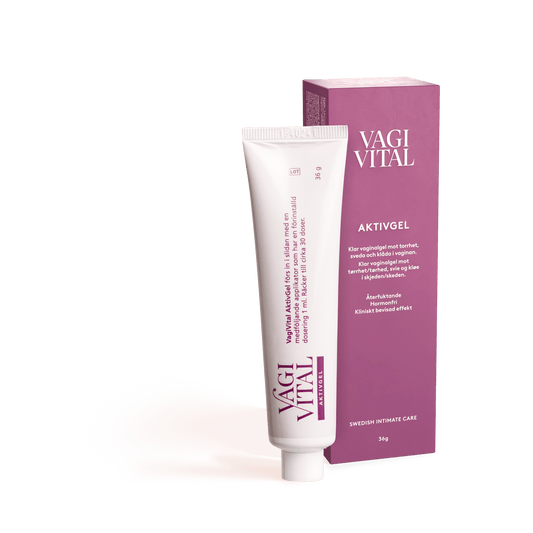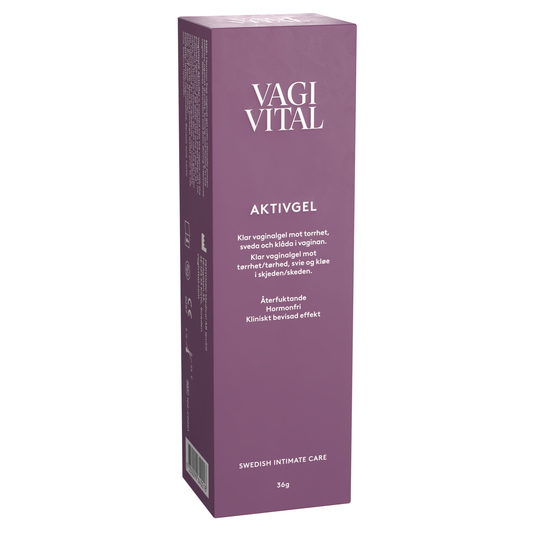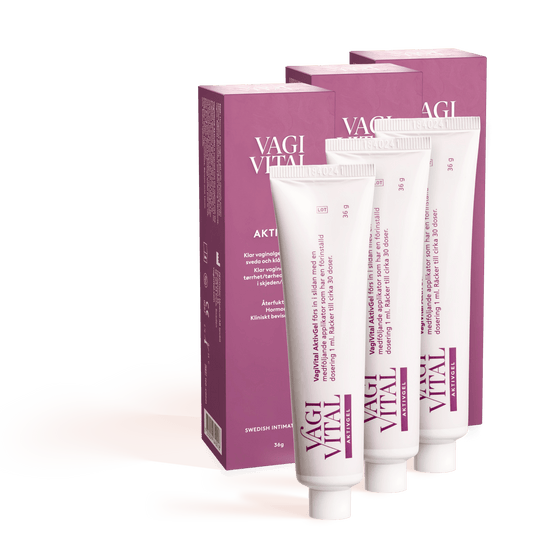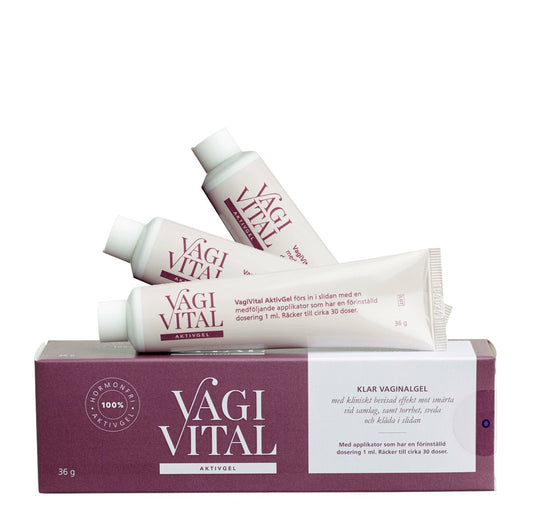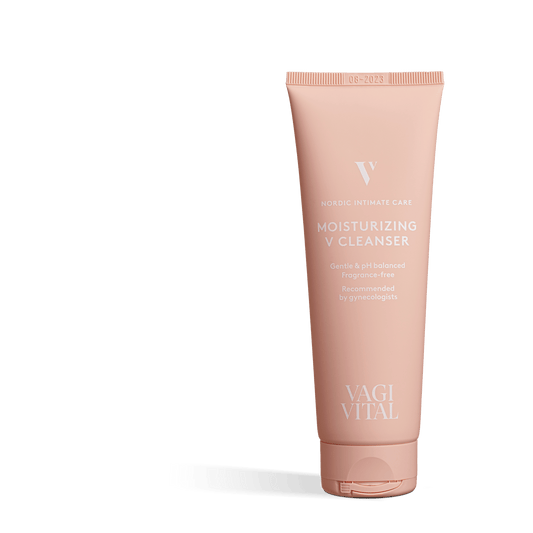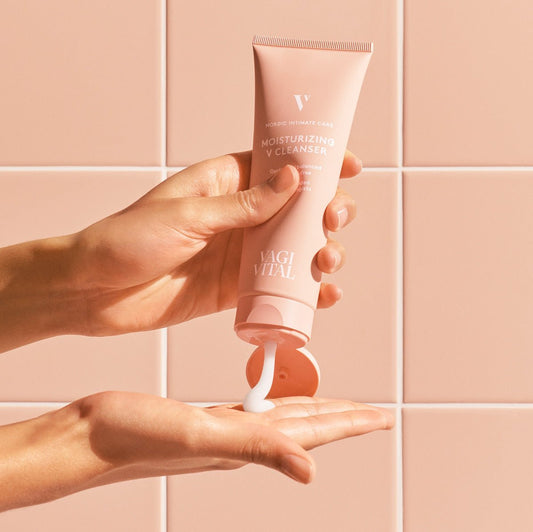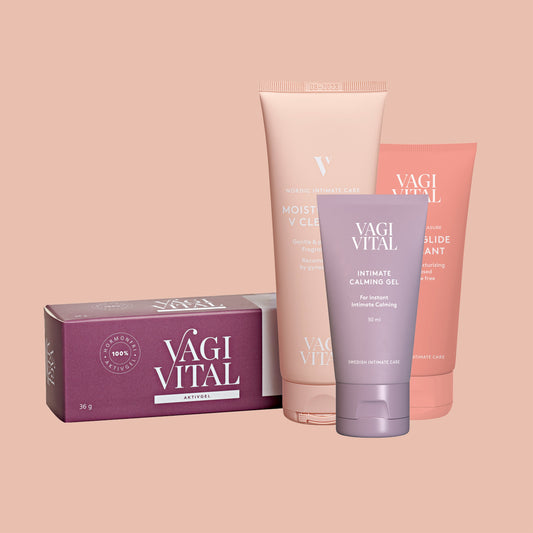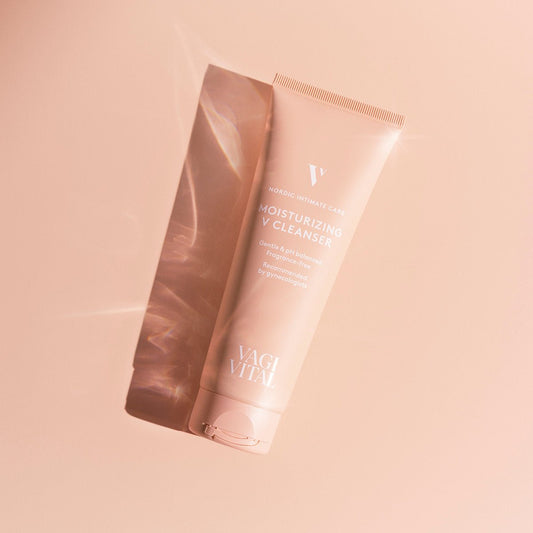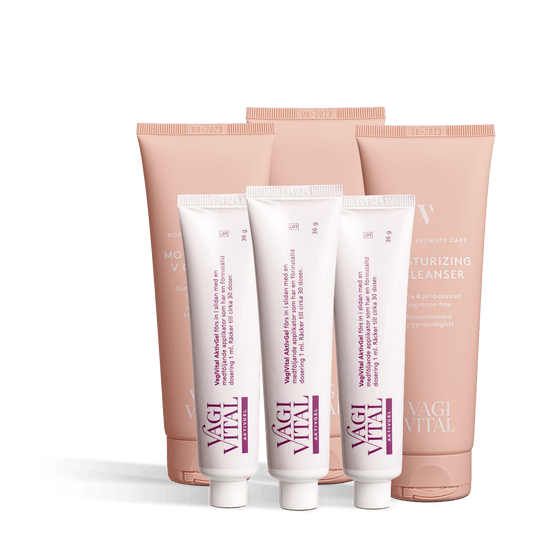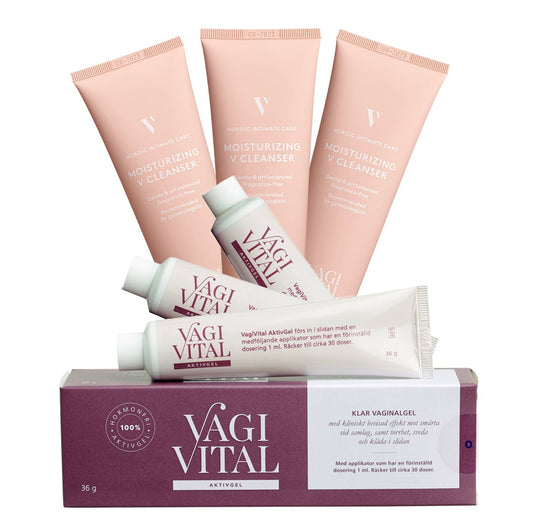Pain during intercourse? Here are the causes and how you can relieve it
We receive numerous reviews from women who share how they have finally been able to resume an active sex life thanks to VagiVital AktivGel, especially when pain during intercourse has been caused by dry mucous membranes. Our clinical studies at Swedish university hospitals also show that AktivGel effectively relieves pain during intercourse by moisturizing and strengthening the mucous membranes. However, pain during intercourse, also known as dyspareunia, can have several different causes. To find the right treatment, it is important to understand what lies behind the pain. Here we go through the most common causes and how you can recognize the symptoms.
WHAT IS PAIN DURING INTERCOURSE?
Pain during intercourse, or dyspareunia, means experiencing pain during or after sex. This pain can be superficial, at the vaginal opening, or deeper inside the pelvis. The pain can range from mild and temporary to so intense that intercourse becomes impossible. For many women, this can be a barrier to enjoying an active and satisfying sex life.
WHAT DOES PAIN DURING INTERCOURSE FEEL LIKE?
Symptoms of pain during intercourse can vary depending on the cause. You may experience a burning or stabbing sensation at the vaginal opening, sharp or cramp-like pains in the pelvis, or a dull ache deep inside the genital area. The pain can be present throughout intercourse or occur afterward and persist for several hours or days.
FIVE COMMON CAUSES OF PAIN DURING INTERCOURSE
Pain during intercourse can have several different causes. Here are some of the most common and how they can affect you:
1. Vaginal dryness: Common and treatable
Vaginal dryness is one of the most common causes of pain during intercourse, especially among women undergoing or having gone through menopause. But dry mucous membranes can affect women of all ages and can be caused by factors such as antidepressant medications (SSRIs), breastfeeding, the postpartum period, certain diseases, and the use of birth control pills. When estrogen levels drop, the mucous membranes in the genital area lose their natural moisture and elasticity. This makes them thinner and more sensitive, increasing friction during intercourse and thus the risk of pain. A study published in *The Journal of Sexual Medicine* showed that vaginal dryness can increase the risk of pain during intercourse by up to 50%. Using moisturizing products like VagiVital AktivGel can help restore moisture balance and reduce discomfort.
Read more about dry mucous membranes during antidepressant medication here.
2. Vaginismus: A reflexive reaction
Vaginismus is a condition where the muscles of the vagina contract involuntarily during attempts at penetration, which can make intercourse very painful or even impossible. This muscle contraction can be triggered by fear of pain, previous traumatic experiences, or other psychological factors such as anxiety or stress. According to research published in The American Journal of Obstetrics and Gynecology, vaginismus is estimated to affect between 0.5% and 1% of women globally. Because many women do not seek help or may not be aware that their symptoms can be treated, vaginismus is often underdiagnosed. For women suffering from vaginismus, it is important to know that help is available, including psychological therapy and physiotherapy.
3. Infections: A common cause of pain
Infections such as urinary tract infections (UTI), yeast infections, or sexually transmitted infections (STI) can also cause pain during intercourse. These infections often lead to inflammation and irritation of the mucous membranes in the genital area, making the tissues more sensitive to pain from touch or pressure. Yeast infections can cause intense itching and swelling, making intercourse uncomfortable or painful. It is important to quickly identify and treat these infections with the right medication to avoid long-term complications.
VagiVital Urinary Tract Infection Self-Test measures 4 parameters (leukocytes, blood, protein, and nitrites) with 99% accuracy and contains 3 test strips. Always have a test at home to quickly identify an infection. Buy here.
4. Endometriosis: A complex cause of pain
Endometriosis is a chronic condition where tissue similar to the uterine lining grows outside the uterus, for example on the ovaries, fallopian tubes, or other parts of the pelvis. This tissue responds to hormonal changes in the body, which can lead to inflammation, scarring, and pain, especially during menstruation and intercourse. According to research from The American College of Obstetricians and Gynecologists, it is estimated that endometriosis affects between 10–15% of women of reproductive age globally, meaning millions of women worldwide experience pain during intercourse as a direct result of this condition. Treatment may include hormone therapy, painkillers, and in some cases surgery to remove the abnormal tissue.
5. Vulvodynia (Vestibulitis): A painful reality
Vulvodynia is a chronic pain condition characterized by pain, burning sensation, or irritation in the vulva, often without a clear underlying cause. Research shows that vulvodynia can be due to a combination of different factors. Common causes include repeated yeast infections and frequent use of antifungal treatments. Having sex despite vaginal dryness or decreased desire can also contribute to the development of the pain. For some women, the pain may be linked to previous childbirth injuries, intensive pelvic floor training, or prior surgeries in the genital area, which can lead to an overstrained pelvic floor.
The condition is most common among women aged 18 to 25, and it is estimated that about one in ten women in this age group suffer from vulvar pain. Since vulvodynia can affect both physical and emotional health, it is important that treatment takes into account the whole individual's needs and life situation.
Read Rebecka Kaplan Sturk, senior consultant gynecology/obstetrics, blog about vulvodynia here.
VAGIVITAL AKTIVGEL: A SOLUTION FOR PAIN DURING INTERCOURSE
When pain during intercourse is caused by dry and sensitive mucous membranes, VagiVital AktivGel has proven to be an effective solution ❤️ This hormone-free gel is developed to moisturize and strengthen the mucous membranes in the genital area, which can reduce friction during intercourse and thus relieve pain. A clinical study published in the International Urogynecology Journal showed that regular use of VagiVital AktivGel over a period of 90 days (equivalent to 3 tubes) resulted in significantly improved symptoms of vaginal dryness and pain during intercourse. Women who participated in the study reported that after treatment they were able to resume an active and enjoyable sex life without the pain that had previously hindered them. The gel's moisturizing and protective properties help strengthen the mucous membranes, restore balance in the genital area, and create a smoother and more comfortable experience during intercourse ❤️
Buy a 3-pack of VagiVital AktivGel and get 10% off here.
REGAINING YOUR PLEASURE
Having sex when you are dry or not really feeling desire can lead to pain, irritation, and long-term problems like vulvodynia. Research shows that sex without sufficient moisture can cause small injuries to the mucous membranes, increasing the risk of infections and discomfort. A study published in The Journal of Sexual Medicine showed that women who have sex without being sufficiently moist are at higher risk of irritation and pain in the genital area. These small injuries can also lead to recurring infections, which further deteriorate the health of the mucous membranes and increase the risk of chronic pain conditions like vulvodynia.
That is why it is super important to always use a good lubricant if you feel dry and to never feel pressured to have sex if you don't really want to. Your body sends signals for a reason and ignoring them can negatively affect both your physical and emotional health.
Also remember that sex does not always have to involve penetration. There are many other ways to be close and intimate. Slow Sex, for example, is about taking it easy and focusing on closeness and touch instead of rushing something. By letting go of performance demands, you can let the body respond naturally and create a deeper, more meaningful experience ❤️
Read the blog Slow Sex: Slow pleasure on women's terms here.
Take care of yourself & Stay Pussytive ❤️
/Fanny Falkman Grinndal
Business Manager Nordics
Peptonic Medical AB
fanny.falkman-grinndal@peptonicmedical.se
Recommended products for you
- Choosing a selection results in a full page refresh.
- Opens in a new window.


